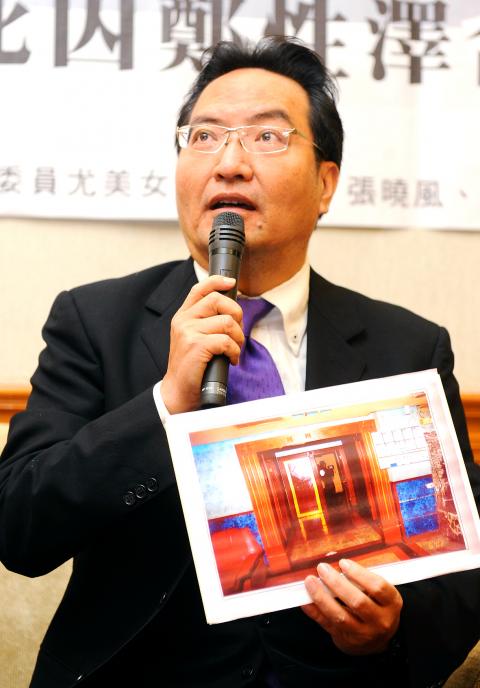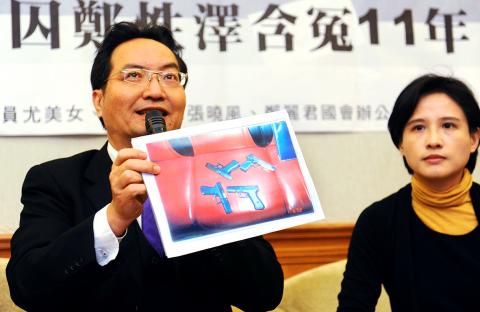Human rights activists and lawmakers yesterday challenged the death sentence against Cheng Hsing-tse (鄭性澤), saying that hard evidence supporting his conviction, as well as steps in standard operation procedures in investigating the homicide case, were missing.
“I would like to ask everyone in the judiciary to carefully examine all the evidence, and answer this question: Do you feel comfortable sentencing this person to death?” Law Bing-ching (羅秉成), the lawyer who represents Cheng, told a press conference at the legislature. “I am an attorney and I would say that after looking at the evidence we have seen so far, I would not be comfortable doing so.”
Cheng was accused of murdering a police officer, Su Hsien-pi (蘇憲丕), during an exchange of fire in a KTV room in then-Taichung City on Jan. 2, 2002.

Photo: Chang Chia-ming, Taipei Times
On that day, police were called to handle a shooting incident in a KTV room, after a drunk man, Lo Wu-hsiung (羅武雄), fired two shots — one at the ceiling and another at a bottle of liquor — in the room.
An exchange of fire took place immediately after police officers entered the room.
Both Su and Lo were killed, by three and two gunshots respectively, while several others in the room, including Cheng, were wounded.

Photo: Chang Chia-ming, Taipei Times
After investigations and meetings, the court concluded that, while Lo fired the first shot, Cheng had fired the next two shots, and sentenced Cheng to death.
Despite several appeals and extraordinary appeals, the efforts to save Cheng have so far been in vain.
Law said there was no evidence that anyone besides Lo had fired at the police officers.
In addition, Cheng has said that police used torture during interrogation to extract a confession from him, Lo added.
“Most importantly, standard procedures, such as ballistic analysis and video recordings of the immediate investigation on the crime scene, are missing,” Law said.
The National Police Agency first said that there was no video recording of the crime scene. However, after Lo showed the police a photograph taken at the crime scene showing an officer holding a camcorder, the agency retracted its statement, and said that there was a video recording, but the cameraman had been ordered to stop recording as he was getting in the way of photographers, Law said.
“The agency is lying. We’ve found a video clip of the police interrogation of Cheng, and the officer interrogating Cheng clearly stated that ‘the entire investigation process was recorded on video,’” Law said.
“I don’t know whether the missing video clip would be good or bad for Cheng, but it may be the key to discovering the truth,” Law said. “I urge the agency to give us the video clip.”
“You don’t have to be a legal expert to know that there’s something fishy about the case,” People First Party Legislator Chang Show-foong (張曉風) said.
“I don’t support abolishing capital punishment, but it’s not justified to execute someone who has not committed a crime. This is not only about a precious life, but also about protecting the judiciary’s dignity,” she said.
Chang and Democratic Progressive Party Legislator Cheng Li-chun (鄭麗君) urged the public to show more concern about the case and to pressure the Ministry of Justice to reexamine it.
“If we do nothing to stop execution of an innocent person, the judiciary would become a murderer, and, since we have not done anything to stop it, we are all guilty,” Cheng Li-chun said.

The manufacture of the remaining 28 M1A2T Abrams tanks Taiwan purchased from the US has recently been completed, and they are expected to be delivered within the next one to two months, a source said yesterday. The Ministry of National Defense is arranging cargo ships to transport the tanks to Taiwan as soon as possible, said the source, who is familiar with the matter. The estimated arrival time ranges from late this month to early next month, the source said. The 28 Abrams tanks make up the third and final batch of a total of 108 tanks, valued at about NT$40.5 billion

A group from the Taiwanese Designers in Australia association yesterday represented Taiwan at the Midsumma Pride March in Melbourne. The march, held in the St. Kilda suburb, is the city’s largest LGBTQIA+ parade and the flagship event of the annual Midsumma Festival. It attracted more than 45,000 spectators who supported the 400 groups and 10,000 marchers that participated this year, the association said. Taiwanese Designers said they organized a team to march for Taiwan this year, joining politicians, government agencies, professionals and community organizations in showing support for LGBTQIA+ people and diverse communities. As the first country in Asia to legalize same-sex

Travel agencies in Taiwan are working to secure alternative flights for travelers bound for New Zealand for the Lunar New Year holiday, as Air New Zealand workers are set to strike next week. The airline said that it has confirmed that the planned industrial action by its international wide-body cabin crew would go ahead on Thursday and Friday next week. While the Auckland-based carrier pledged to take reasonable measures to mitigate the impact of the workers’ strike, an Air New Zealand flight arriving at Taipei from Auckland on Thursday and another flight departing from Taipei for Auckland on Saturday would have to

MOTIVES QUESTIONED The PLA considers Xi’s policies toward Taiwan to be driven by personal considerations rather than military assessment, the Epoch Times reports Chinese President Xi Jinping’s (習近平) latest purge of the Chinese People’s Liberation Army (PLA) leadership might have been prompted by the military’s opposition to plans of invading Taiwan, the Epoch Times said. The Chinese military opposes waging war against Taiwan by a large consensus, putting it at odds with Xi’s vision, the Falun Gong-affiliated daily said in a report on Thursday, citing anonymous sources with insight into the PLA’s inner workings. The opposition is not the opinion of a few generals, but a widely shared view among the PLA cadre, the Epoch Times cited them as saying. “Chinese forces know full well that